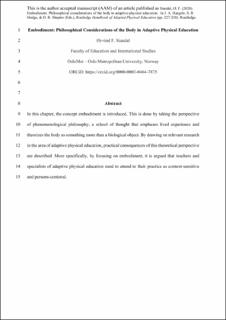| dc.contributor.author | Standal, Øyvind Førland | |
| dc.date.accessioned | 2021-09-16T09:14:36Z | |
| dc.date.available | 2021-09-16T09:14:36Z | |
| dc.date.created | 2020-08-26T09:49:37Z | |
| dc.date.issued | 2020-01-30 | |
| dc.identifier.isbn | 9780367146115 | |
| dc.identifier.uri | https://hdl.handle.net/11250/2778516 | |
| dc.description.abstract | In this chapter, the concept embodiment is introduced. This is done by taking the perspective of phenomenological philosophy, a school of thought that emphases lived experience and theorizes the body as something more than a biological object. By drawing on relevant research in the area of adaptive physical education, practical consequences of this theoretical perspective are described. More specifically, by focusing on embodiment, it is argued that teachers and specialists of adaptive physical education need to attend to their practice as context-sensitive and persons-centered. | en_US |
| dc.language.iso | eng | en_US |
| dc.publisher | Routledge | en_US |
| dc.relation.ispartof | Routledge Handbook of Adapted Physical Education | |
| dc.relation.uri | https://www.taylorfrancis.com/chapters/edit/10.4324/9780429052675-18/embodiment-%C3%B8yvind-standal | |
| dc.subject | Embodiment | en_US |
| dc.subject | Phenomenological philosophy | en_US |
| dc.subject | Physical education | en_US |
| dc.subject | Philosophical perspectives | en_US |
| dc.subject | Bodily spaces | en_US |
| dc.title | Embodiment. Philosophical considerations of the body in adaptive physical education. | en_US |
| dc.type | Chapter | en_US |
| dc.type | Peer reviewed | en_US |
| dc.description.version | acceptedVersion | en_US |
| cristin.ispublished | true | |
| cristin.fulltext | postprint | |
| cristin.qualitycode | 2 | |
| dc.identifier.doi | https://doi.org/10.4324/9780429052675 | |
| dc.identifier.cristin | 1825200 | |
| dc.source.pagenumber | 227-238 | en_US |
